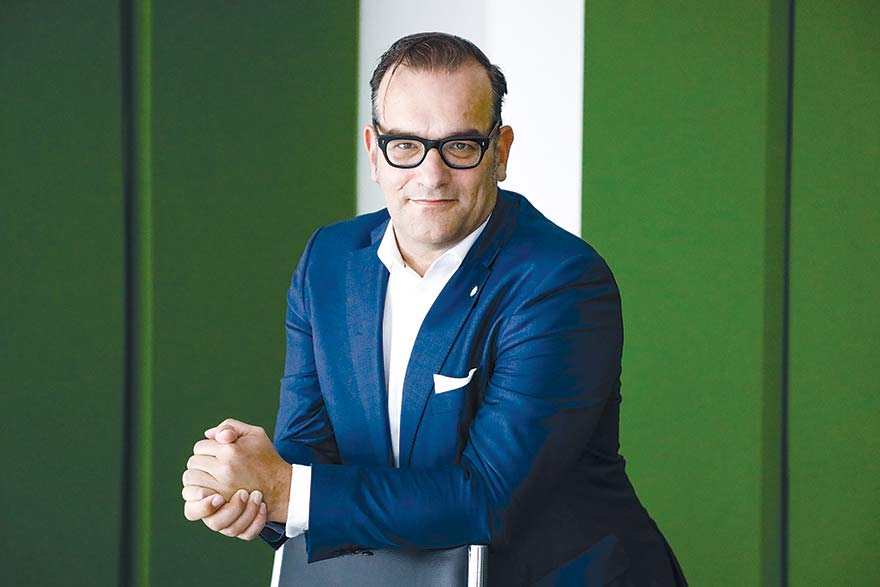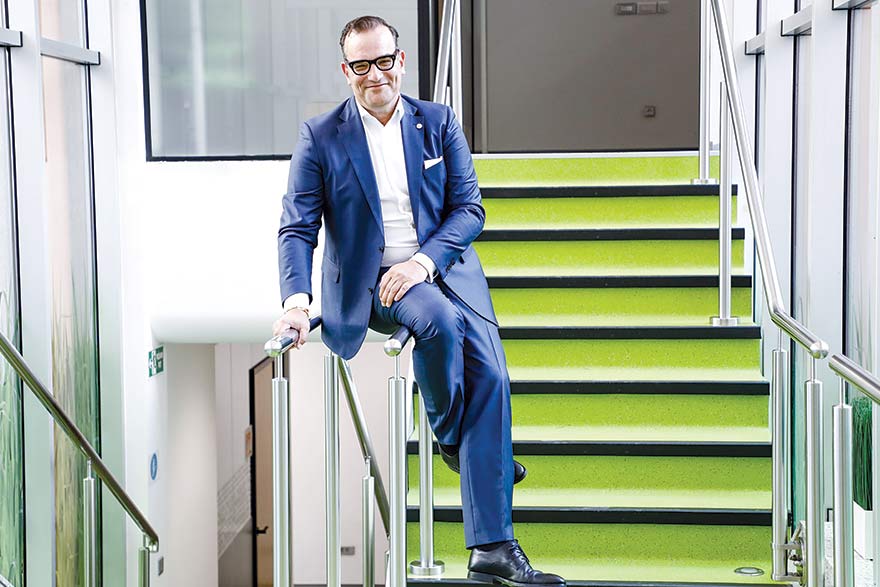You don’t need to be a businessman to know that the shortfalls in production during the spring will affect balance sheets for 2020. However, there is a window of opportunity for institutional changes that may help the business community and keep us all healthy and in our workplaces. And then it will be possible to break new records, as we have done at AHK over the past decade
I feel a great pleasure when I look back and see the way in which German investments developed in Serbia. This year is of special importance to us because we symbolically mark two decades of the presence of the German economy in this region. About 450 German companies operate in Serbia today, employing over 60,000 employees. Figuratively speaking, an entire Pirot or Kikinda work at the companies that came to Serbia from Germany, points out Dr Ronald Seeliger, President of the German-Serbian Chamber of Commerce and CEO of Hemofarm, speaking to CorD.
You have spent two terms in office as the head of the German- Serbian Chamber of Commerce, which has represented an important link between Serbia and Germany. In addition to the permanent growth of German investments in Serbia, what were the greatest achievements of AHK in the previous years, in your opinion? Is there an achievement that you find crucial, but that has been less known to the general public?
– More precisely, if we count the period when AHK had another form of presentation in Serbia, I have been a member of the leadership of this organisation for seven years. I mention this because I’ve played an active role over this fairly long period of time, in the continuous economic rise of my home country in the country in which I now work, and I think this is my greatest satisfaction.
Mind you, we are talking about a serious increase of investments and growth of foreign trade between Germany and Serbia. If I tell you that the trade between our two countries has increased two and a half fold over the past decade, and that it reached as much as five billion euros last year, which is a remarkable record in our economic cooperation, I believe I have every reason to be a proud German in Serbia. Unfortunately, this information has not received the deserved spotlight, because the current pandemic has taken us in another direction. Namely, we have paid more attention to finding a way to help the operation of the economy at this critical juncture than we have had time to summarise the results of the last year.
However, here is the opportunity to also mention some of the economic records.
Given that you’ve mentioned the pandemic, health and safety seem to be the most important elements of a successful business operation. How are AHK members in Serbia managing the COVID-19 situation in terms of their present activities?
– Let me use the terminology of the sector I come from: this is a unique situation in recent history, where the health crisis has had a dramatic impact on the business scanner. For this very reason, AHK has maintained permanent contacts with its member companies and I can tell you that, not only did they observe the measures prescribed by the state, but they went a step further in order to ensure that their employees remain healthy. There is no worse nightmare for any industry than stopping production, in this particular case due to mass illness of workers. As an employer, you face two responsibilities: to protect the employees and to secure stable production, so you can imagine the magnitude of responsibility of each company.

For example, our task at Hemofarm was to secure the regular supply of the market with medicinal products, namely ensuring that no patient is left without their therapy, and you only can do that if the production is working full steam and if your employees are healthy. Therefore, the focus of our activities over the past several months, as well as today, has been on protective measures for our employees.
Today, almost seven months after the start of the outbreak, could you anticipate the extent to which COVID-19 has influenced business plans for 2020, given the high concentration of companies in the automotive sector and other labour intensive industries?
– You don’t need to be a businessman to know that the shortfalls in production during the spring will affect balance sheets for 2020. However, some industries have recovered quickly following the end of the lockdown, so they will probably end this year better than it initially appeared.
Speaking of the automotive industry, it has certainly been one of the worst affected and it will take time to recover. There are companies in Serbia that are suppliers of German companies in this industry, and we are doing our best to help them. AHK has been implementing a regional project for years called Supplier Initiative, as part of which we have been connecting German companies with supplier companies from Serbia. Not even the pandemic stopped us; we just moved from live meetings to an online format.
If I tell you that the trade between our two countries has increased two and a half fold over the past decade, and that it reached as much as five billion euros last year, I believe I have every reason to be a proud German in Serbia
Right now, in September, we organised a new matchmaking with the participation of over 30 German companies and 50 Serbian ones, while across the area of the Western Balkans this initiative gathered together a total of over 150 companies. This time also most of the interested German companies came from the metal processing industry, the automotive industry supplier sector, as well as from the industry of manufacturing and processing plastic materials.
Despite the global economic crisis, we hope for good results and some new examples of cooperation between Germany and Serbia. To what extent has the current situation impacted on prospective German investors and their plans regarding Serbia? – Let me put it like this: the Coronavirus crisis has shown how sensitive our supply chains are. At the height of the crisis, during April, a kind of panic broke out in many German companies that started discussing the need to shorten and diversify all supply chains. Eastern Asia, for example, was considered a major risk factor. It suddenly became clear that it is never good to be dependent on one supplier alone. I find this experience of fragile supply chains as one of the real and most important messages of the pandemic.

I really think this can be an opportunity for the Western Balkan countries. Serbia now has a good opportunity to present and impose itself to potential investors as a favourable business destination.
How could the new Serbian Government further improve the business environment?
– I think it would be very important for the new Government to start its mandate with a dialogue with chambers of commerce, representatives of national and international companies and renowned businesspeople; to sit around the same table and discuss what has to be changed or improved, especially taking into account the problems that the pandemic brought to the world of business. I therefore propose the start of the new term of the Government begin with an open, goodhearted and cooperative dialogue that will involve as many different actors as possible.
Given your expertise in the medical sector, how would you assess the overall health situation in Serbia? Were companies from the sector able to contribute to the healthcare system in their full capacity?
– I have lived in Serbia for almost nine years, and there are certain things I find to be constant. One of them is the extraordinarily professional level of doctors and other medical staff. If we talk about cooperation with the healthcare system, Hemofarm is well-known to have helped and been a good partner at all times, especially during times of crisis.
Already at the beginning of the pandemic outbreak, we donated medical equipment worth 400,000 euros, which was one of the greatest donations made by companies in this region. Hemofarm Foundation provided financial aid to the cities of Vršac and Šabac, which are the cities where our manufacturing sites are located. However, as I have already stated, our primary task was to provide a regular supply of the market with medicines. As said, we could not have allowed our hospitals to be left without Hemomycin, our antibiotic that was the first line of defence against COVID-19, or pharmacies to be left without the medicines that are used as regular therapies for patients suffering from heart problems and other diseases. We worked night and day, our task was fulfilled, and I am very grateful to our employees for that.
Hemofarm is well-known for having helped and been a good partner to the healthcare sector at all times, especially in times of crisis. We worked night and day, our task was fulfilled, and I am very grateful to our employees for that
How could the healthcare system become more sustainable and capable of addressing similar challenges?
– Speaking of healthcare systems and their sustainability, I think that all those who want to will be able to learn lessons from this experience and be more prepared for some future crisis. If a similar crisis strikes, I believe everyone will react better. What I fear is some crisis in the future that could have a different form than this one, and which could also have global and devastating effects. In short, I think that the crisis plans of international organisations, states and healthcare systems should be revised and updated, and should include many more different scenarios and potential answers. It seems as if the end of the previous century and the beginning of this one spoiled us a little, so the world was not ready for the Coronavirus pandemic.
When it comes to the sustainability of healthcare systems, it is important to point out the following – one of the important experiences we gained over the past few months is digitalisation in all fields, including this one. I think a much greater number of citizens have now realised that digitalisation is very important in the healthcare system and that e-medicine is our near future, and in some cases is already our present. Of course, severe diseases and surgeries require direct contact with a doctor, but the life of people with light or chronic diseases can have a better quality owing to what we call ‘virtual care’. Some examinations, check-ups and prescriptions of therapy are already performed via e-platforms, through which various costs are cut and time is spared for both patients, on the one hand, and doctors and hospitals, on the other. This is why I see the sustainability of the healthcare system precisely in the digitalisation of services in this sector, in higher flexibility and better adaptation to situations among everyone who participates in management, in a more resilient supply chain, and in a higher degree of social solidarity at the global level.
Unfortunately, this pandemic has taken many victims, but it has also born heroes, and here I mean doctors, other medical and nonmedical staff, pharmacists, as well as numerous scientists and researchers. In the post-COVID-19 era, we need new heroes from different professions, those whose knowledge will make this world more resilient to another new crisis.
| OPTIMISM
Despite the global economic crisis, we hope for good results and some new examples of cooperation between Germany and Serbia |
OPPORTUNITY
Given the fragility of supply chains, Serbia now has a good opportunity to present and expose itself to potential investors as a favourable business destination |
PROPOSAL
I propose the start of the new term of the Government begin with an open, goodhearted and cooperative dialogue that will involve as many different actors as possible |
|---|